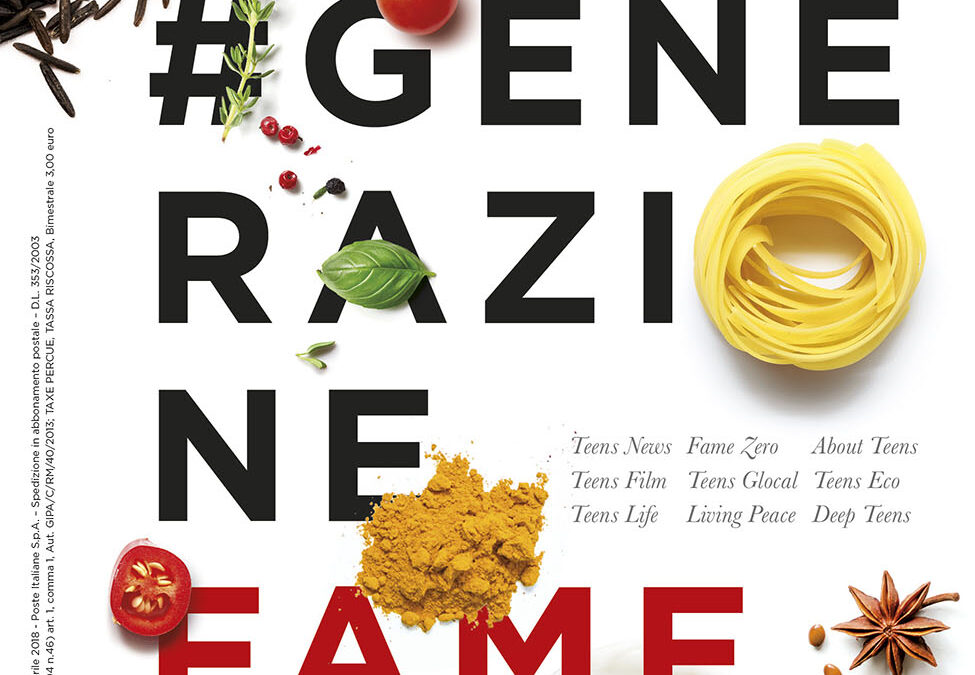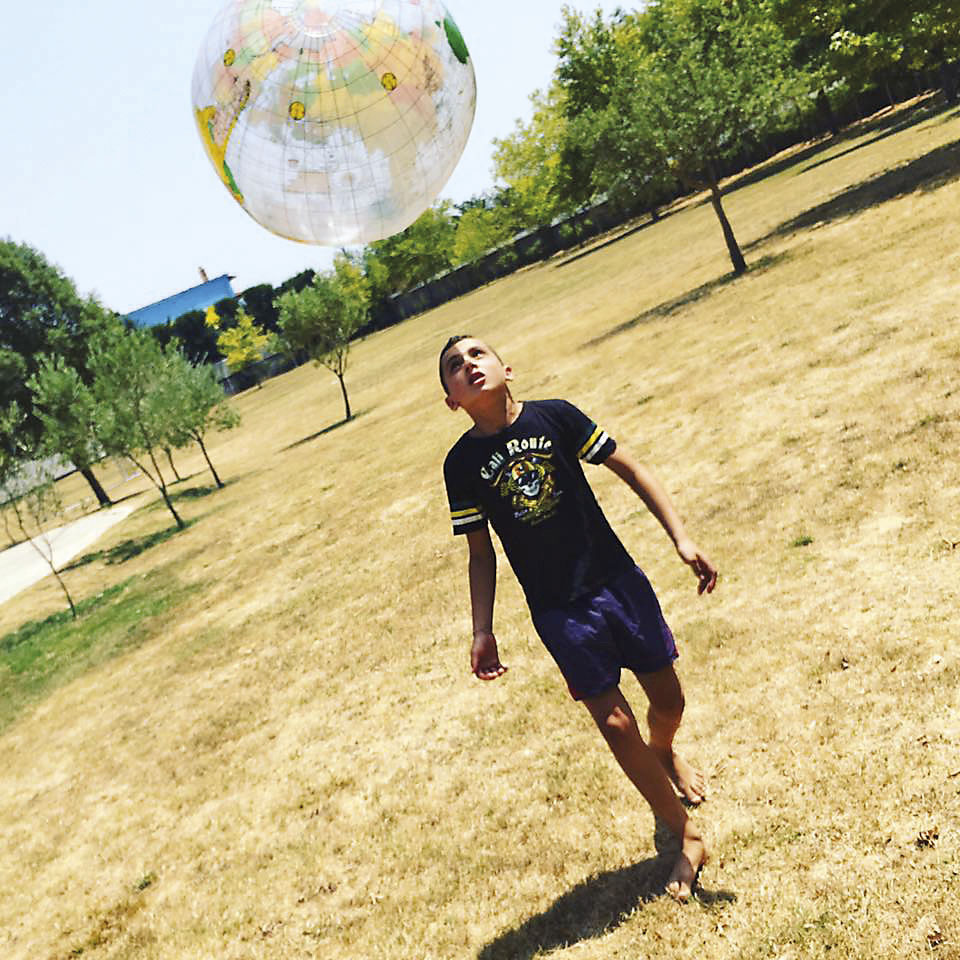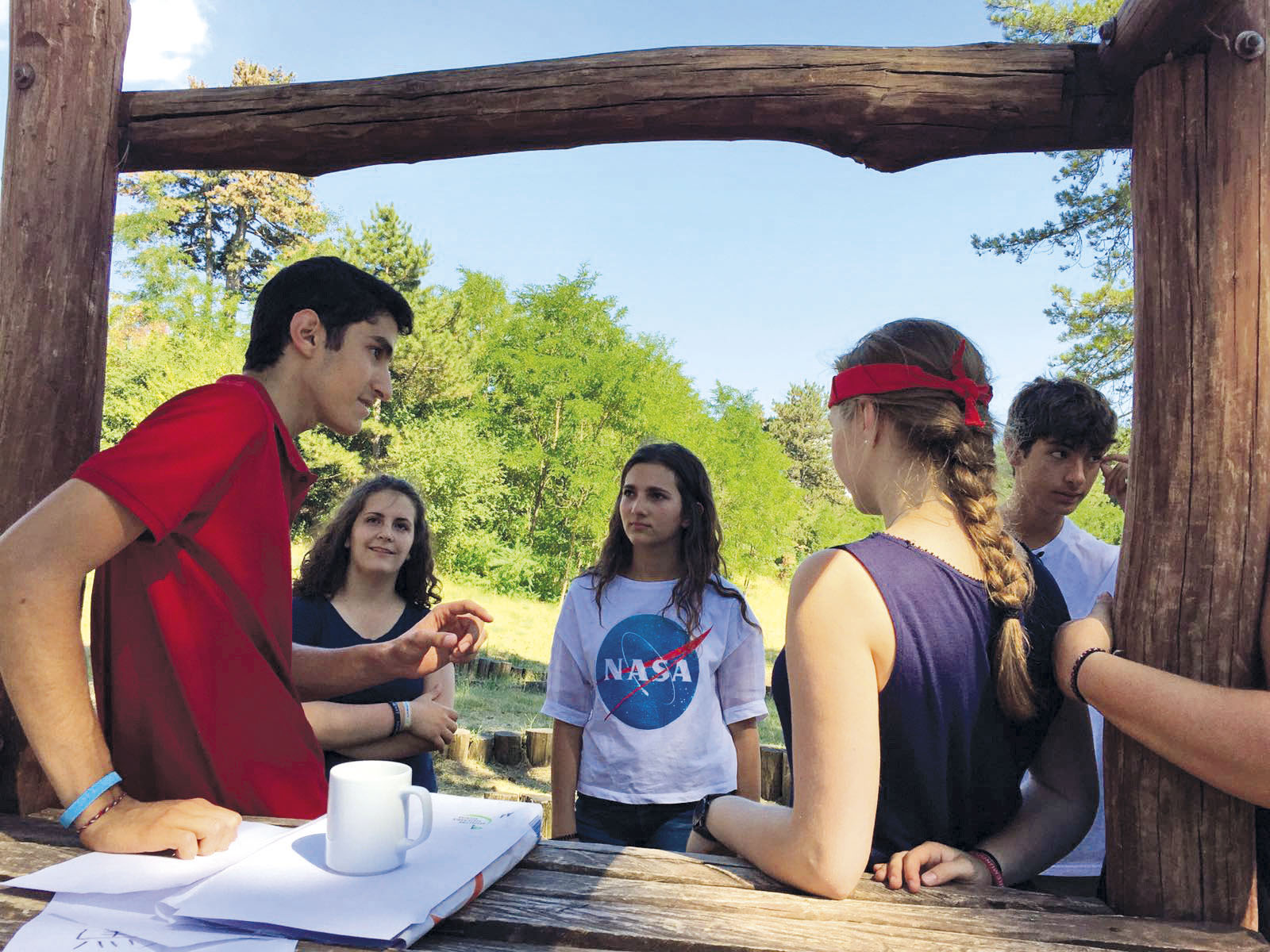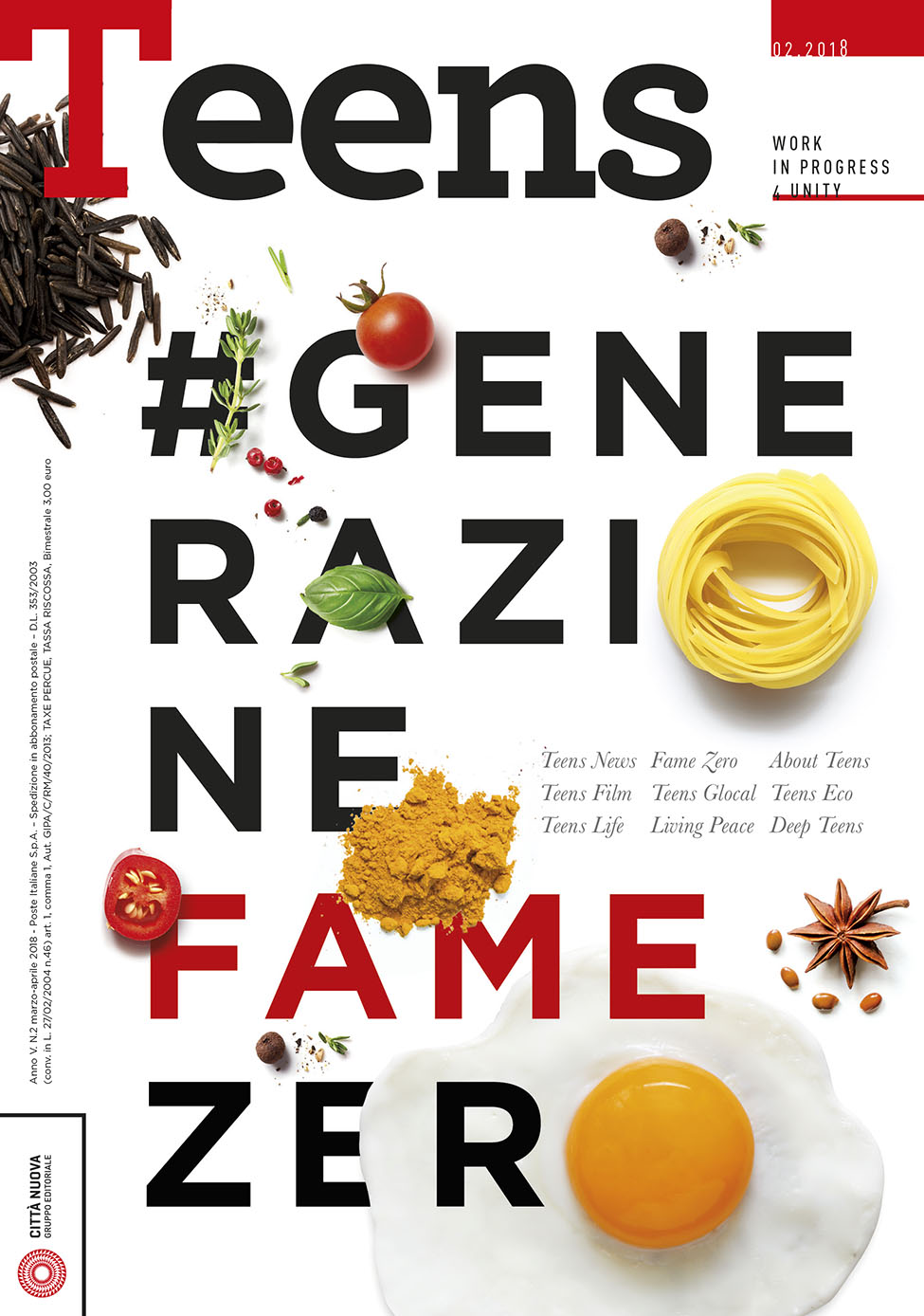
26 Feb 2018 | Focolare Worldwide
 Seventeen sustainable development goals have been identified to be achieved by 2030. They are contained in the UN Agenda approved by the 193 UN member states. “Zero Hunger,” which is at the centre of an agreement signed in 2012 during a United Nations Conference in Rio de Janeiro, aims to free the world from hunger. In response to a request for collaboration sent by the United Nation’s agency, the young people and teenagers of the Focolare Movement decided to step onto the field alongside the FAO, in raising awareness among the generation that we hope will see world hunger defeated. World hunger has been on the rise again for more than a decade. It was recently reported on by the Annual United Nations Report of food safety and nutrition in the world (2017). In 2016, around 815 million people (38 million more than the year before), that is, 11% of the world population, was not sufficiently nourished. Around 155 million children under the age of five are underdeveloped (too short for their age), while 52 million suffer from chronic hunger, which means that their weight is not adequate to their height.
Seventeen sustainable development goals have been identified to be achieved by 2030. They are contained in the UN Agenda approved by the 193 UN member states. “Zero Hunger,” which is at the centre of an agreement signed in 2012 during a United Nations Conference in Rio de Janeiro, aims to free the world from hunger. In response to a request for collaboration sent by the United Nation’s agency, the young people and teenagers of the Focolare Movement decided to step onto the field alongside the FAO, in raising awareness among the generation that we hope will see world hunger defeated. World hunger has been on the rise again for more than a decade. It was recently reported on by the Annual United Nations Report of food safety and nutrition in the world (2017). In 2016, around 815 million people (38 million more than the year before), that is, 11% of the world population, was not sufficiently nourished. Around 155 million children under the age of five are underdeveloped (too short for their age), while 52 million suffer from chronic hunger, which means that their weight is not adequate to their height.  At the same time, because of a lack of healthy nourishment, 600 million people (including 41 million children) suffer from obesity, which is another face of malnutrition. The Report identified armed conflicts as the main cause of the migrations and of the shocks linked to climate change, as several of the key factors of the re-escalation of hunger and the many forms of malnutrition. Freeing the world of hunger will require urgent measures and decisions in favour of more sustainable lifestyles – from the consumer society to a change of course in international politics. But first it requires a stronger awareness and change in personal relationships. This is the message that the Focolare’s Teens for Unity and Youth for a United World have been spreading since last year along with several of their global-level projects: the need for study and becoming aware of the root causes of the problem; observing and monitoring the situation at the local level and involving as many young people, teenagers and associations as possible in: communicating and sharing experiences of working for the poor in their own local environments, for a more sober lifestyle, for dialogue, peace, the environment, welcoming immigrants, and, finally, their proposal to hold world-wide celebrations on the day chosen by the United Nations to be dedicated to the topic of nutrition (October 16).
At the same time, because of a lack of healthy nourishment, 600 million people (including 41 million children) suffer from obesity, which is another face of malnutrition. The Report identified armed conflicts as the main cause of the migrations and of the shocks linked to climate change, as several of the key factors of the re-escalation of hunger and the many forms of malnutrition. Freeing the world of hunger will require urgent measures and decisions in favour of more sustainable lifestyles – from the consumer society to a change of course in international politics. But first it requires a stronger awareness and change in personal relationships. This is the message that the Focolare’s Teens for Unity and Youth for a United World have been spreading since last year along with several of their global-level projects: the need for study and becoming aware of the root causes of the problem; observing and monitoring the situation at the local level and involving as many young people, teenagers and associations as possible in: communicating and sharing experiences of working for the poor in their own local environments, for a more sober lifestyle, for dialogue, peace, the environment, welcoming immigrants, and, finally, their proposal to hold world-wide celebrations on the day chosen by the United Nations to be dedicated to the topic of nutrition (October 16).  #ZeroHunger is now a regular feature of the Teens Magazine, published by Città Nuova in collaboration with the New Families Association, United World Association and the New Humanity Movement. The 2018 March-April edition will be dedicate to this topic. “What a thrill for our delegation,” write the teenagers on the editorial board, “to go into the headquarters of the FAO in Rome. Let’s get started right now so that our generation will truly be the first #GenerationZeroHunger. Teens Magazine will continue to follow this fascinating worldwide project.” The calendar shows April as the month for the publication of the Commitment Statement of the Teens for Unity, which was drawn up by teenagers from eleven countries. In May, the annual events for “United World Week” and “Run4Unity” will be entirely devoted to the topic. In June, a group of 600 children and teenagers (ages 9-12), attending an international congress of the Focolare Movement, will be the guests of the FAO for a morning of discussion and sharing on the topic. Finally, in the month of July, as part of the “United World Project” at Genfest 2018, a forum will be held on the theme #GenerationZeroHunger with the participation of the FAO. Chiara Favotti
#ZeroHunger is now a regular feature of the Teens Magazine, published by Città Nuova in collaboration with the New Families Association, United World Association and the New Humanity Movement. The 2018 March-April edition will be dedicate to this topic. “What a thrill for our delegation,” write the teenagers on the editorial board, “to go into the headquarters of the FAO in Rome. Let’s get started right now so that our generation will truly be the first #GenerationZeroHunger. Teens Magazine will continue to follow this fascinating worldwide project.” The calendar shows April as the month for the publication of the Commitment Statement of the Teens for Unity, which was drawn up by teenagers from eleven countries. In May, the annual events for “United World Week” and “Run4Unity” will be entirely devoted to the topic. In June, a group of 600 children and teenagers (ages 9-12), attending an international congress of the Focolare Movement, will be the guests of the FAO for a morning of discussion and sharing on the topic. Finally, in the month of July, as part of the “United World Project” at Genfest 2018, a forum will be held on the theme #GenerationZeroHunger with the participation of the FAO. Chiara Favotti
26 Feb 2018 | Non categorizzato, Word of
for ages 4-8 | for ages 9-17 | Print | Audio https://www.focolare.org/gb/files/2018/03/201803WOL.mp3 King David, who was also a prophet, wrote this psalm at a time when he felt weighed down by anguish and poverty and in danger from his enemies. He wanted to find a way out of his painful situation, but realized he was completely unable to do so. Therefore he looked up, with hope, toward the God of Israel, who had always protected his people, and implored him to come to his aid. This month’s Word of Life draws our attention to the fact that he was asking to know the ways and paths of the Lord, to shed light on the choices he had to make, especially at difficult times. “Make me to know your ways, O Lord; teach me your paths.” Sometimes in life we too have to make decisive choices. It can be totally absorbing to have to do so, and it can help us to think deeply about what our conscience suggests is the right way forward. It could be that we have many paths to choose from and are uncertain about which is the best. At other times, we may feel there is no path at all. Wanting to find a way ahead is a strong human need, and so sometimes we ask help from those we consider our friends. Christian faith makes us become friends with God. He is a Father who loves us; he knows us through and through and wants to accompany us on our journey. Every day, God invites us to set out freely on an adventure. Our compass is unselfish love for him and all his children. The ways and paths are opportunities to meet other travelers and find new goals that can be shared. Christians are never isolated individuals, but part of a people travelling towards the fulfilment of the plan of God the Father for humankind. Through all he said and did, Jesus revealed God’s plan to bring about universal fraternity, the civilization of love. “Make me to know your ways, O Lord; teach me your paths.” The Lord’s ways can be daring and, at times, may seem too challenging for us, like rope bridges stretching between high cliffs. They challenge our selfish habits, our prejudices and false humility, and instead create opportunities for dialogue, encounter and commitment to the common good. Above all, they call for a love that is ever new and capable of forgiving, because it is founded on the rock of God’s love and faithfulness to us. This ever-new love is essential if we are to build just and peaceful relationships among peoples and nations. Even the witness given by a simple kind deed, done with love, can give others the light to see their way forward. At a gathering in Nigeria, when both children and adults were sharing their experiences of loving according to the Gospel, a little girl called Maya said, “Yesterday, when we were playing, a boy pushed me and I fell over. He said ‘sorry’ and I forgave him.” Those words touched the heart of a man whose father was killed by Boko Haram. “I looked at Maya. If a little girl like her can forgive, it means that I can do the same.” “Make me to know your ways, O Lord; teach me your paths.” If we want a sure guide on our journey, let’s remember that Jesus said, “I am the Way…” (Jn 14:6). When Chiara Lubich spoke to young people gathered in Santiago de Compostela during the 1989 World Youth Day, she encouraged them: “By describing himself as ‘the Way’, Jesus was saying we must take the same way as he did. We could therefore say that the way Jesus followed has a name: it is love. The love that Jesus lived and brought on earth is special and unique. It is the same ardent love that burns in God … “But who should we love? Our first duty of course, is to love God. Then, to love our neighbor, every neighbor … From the moment we wake up in the morning until we go to sleep at night, every relationship with our neighbor should be lived with this love. Whether we are at home, at college, at work, on a sports field, on vacation, in church or on the street, we should take advantage of every opportunity to love, seeing Jesus in our neighbors, neglecting no one, being the first to love … “This means entering as far as possible into the minds and hearts of others, truly understanding their problems, needs and troubles — as well as their joys, so that we can share everything with them … “In a way, we have to become that other person, just as Jesus, who was God, became a man out of love. Then our neighbors will feel understood and supported because someone is helping them bear their burdens and pain and share in their joys. ‘Living the other person,’ ‘living the others’ – this is a great ideal; this is amazing.” Letizia Magri

 Seventeen sustainable development goals have been identified to be achieved by 2030. They are contained in the UN Agenda approved by the 193 UN member states. “Zero Hunger,” which is at the centre of an agreement signed in 2012 during a United Nations Conference in Rio de Janeiro, aims to free the world from hunger. In response to a request for collaboration sent by the United Nation’s agency, the young people and teenagers of the Focolare Movement decided to step onto the field alongside the FAO, in raising awareness among the generation that we hope will see world hunger defeated. World hunger has been on the rise again for more than a decade. It was recently reported on by the Annual United Nations Report of food safety and nutrition in the world (2017). In 2016, around 815 million people (38 million more than the year before), that is, 11% of the world population, was not sufficiently nourished. Around 155 million children under the age of five are underdeveloped (too short for their age), while 52 million suffer from chronic hunger, which means that their weight is not adequate to their height.
Seventeen sustainable development goals have been identified to be achieved by 2030. They are contained in the UN Agenda approved by the 193 UN member states. “Zero Hunger,” which is at the centre of an agreement signed in 2012 during a United Nations Conference in Rio de Janeiro, aims to free the world from hunger. In response to a request for collaboration sent by the United Nation’s agency, the young people and teenagers of the Focolare Movement decided to step onto the field alongside the FAO, in raising awareness among the generation that we hope will see world hunger defeated. World hunger has been on the rise again for more than a decade. It was recently reported on by the Annual United Nations Report of food safety and nutrition in the world (2017). In 2016, around 815 million people (38 million more than the year before), that is, 11% of the world population, was not sufficiently nourished. Around 155 million children under the age of five are underdeveloped (too short for their age), while 52 million suffer from chronic hunger, which means that their weight is not adequate to their height.  At the same time, because of a lack of healthy nourishment, 600 million people (including 41 million children) suffer from obesity, which is another face of malnutrition. The Report identified armed conflicts as the main cause of the migrations and of the shocks linked to climate change, as several of the key factors of the re-escalation of hunger and the many forms of malnutrition. Freeing the world of hunger will require urgent measures and decisions in favour of more sustainable lifestyles – from the consumer society to a change of course in international politics. But first it requires a stronger awareness and change in personal relationships. This is the message that the Focolare’s Teens for Unity and Youth for a United World have been spreading since last year along with several of their global-level projects: the need for study and becoming aware of the root causes of the problem; observing and monitoring the situation at the local level and involving as many young people, teenagers and associations as possible in: communicating and sharing experiences of working for the poor in their own local environments, for a more sober lifestyle, for dialogue, peace, the environment, welcoming immigrants, and, finally, their proposal to hold world-wide celebrations on the day chosen by the United Nations to be dedicated to the topic of nutrition (October 16).
At the same time, because of a lack of healthy nourishment, 600 million people (including 41 million children) suffer from obesity, which is another face of malnutrition. The Report identified armed conflicts as the main cause of the migrations and of the shocks linked to climate change, as several of the key factors of the re-escalation of hunger and the many forms of malnutrition. Freeing the world of hunger will require urgent measures and decisions in favour of more sustainable lifestyles – from the consumer society to a change of course in international politics. But first it requires a stronger awareness and change in personal relationships. This is the message that the Focolare’s Teens for Unity and Youth for a United World have been spreading since last year along with several of their global-level projects: the need for study and becoming aware of the root causes of the problem; observing and monitoring the situation at the local level and involving as many young people, teenagers and associations as possible in: communicating and sharing experiences of working for the poor in their own local environments, for a more sober lifestyle, for dialogue, peace, the environment, welcoming immigrants, and, finally, their proposal to hold world-wide celebrations on the day chosen by the United Nations to be dedicated to the topic of nutrition (October 16).  #ZeroHunger is now a regular feature of the Teens Magazine, published by Città Nuova in collaboration with the New Families Association, United World Association and the New Humanity Movement. The 2018 March-April edition will be dedicate to this topic. “What a thrill for our delegation,” write the teenagers on the editorial board, “to go into the headquarters of the FAO in Rome. Let’s get started right now so that our generation will truly be the first #GenerationZeroHunger. Teens Magazine will continue to follow this fascinating worldwide project.” The calendar shows April as the month for the publication of the Commitment Statement of the Teens for Unity, which was drawn up by teenagers from eleven countries. In May, the annual events for “United World Week” and “Run4Unity” will be entirely devoted to the topic. In June, a group of 600 children and teenagers (ages 9-12), attending an international congress of the Focolare Movement, will be the guests of the FAO for a morning of discussion and sharing on the topic. Finally, in the month of July, as part of the “United World Project” at Genfest 2018, a forum will be held on the theme #GenerationZeroHunger with the participation of the FAO. Chiara Favotti
#ZeroHunger is now a regular feature of the Teens Magazine, published by Città Nuova in collaboration with the New Families Association, United World Association and the New Humanity Movement. The 2018 March-April edition will be dedicate to this topic. “What a thrill for our delegation,” write the teenagers on the editorial board, “to go into the headquarters of the FAO in Rome. Let’s get started right now so that our generation will truly be the first #GenerationZeroHunger. Teens Magazine will continue to follow this fascinating worldwide project.” The calendar shows April as the month for the publication of the Commitment Statement of the Teens for Unity, which was drawn up by teenagers from eleven countries. In May, the annual events for “United World Week” and “Run4Unity” will be entirely devoted to the topic. In June, a group of 600 children and teenagers (ages 9-12), attending an international congress of the Focolare Movement, will be the guests of the FAO for a morning of discussion and sharing on the topic. Finally, in the month of July, as part of the “United World Project” at Genfest 2018, a forum will be held on the theme #GenerationZeroHunger with the participation of the FAO. Chiara Favotti